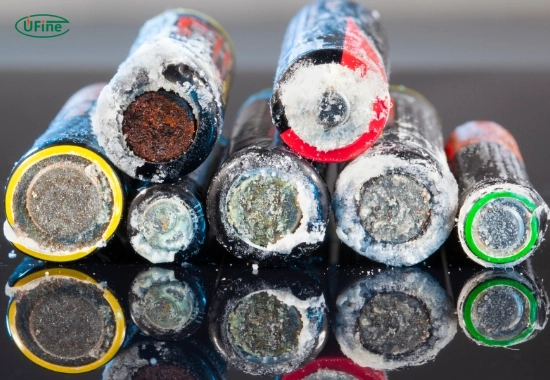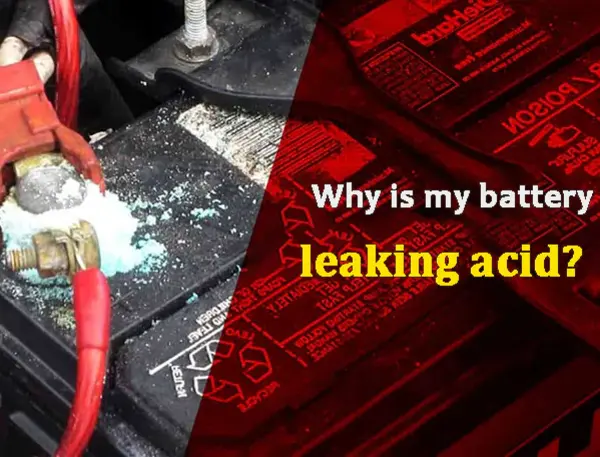
- Part 1. What Does Battery Acid Smell Like?
- Part 2. Key takeaways (quick summary)
- Part 3. What is battery acid?
- Part 4. Why do lead-acid batteries leak or smell?
- Part 5. What does battery acid smell like?
- Part 6. Is battery acid smell dangerous?
- Part 7. What to do when a battery leaks acid
- Part 8. What does battery acid look like?
- Part 9. FAQs about battery acid smell and safety
- Part 10. Conclusion
Part 1. What Does Battery Acid Smell Like?
How to Identify, Understand, and Respond to a Dangerous Warning Sign
Battery acid—technically sulfuric acid electrolyte used in lead-acid batteries—is not something most people expect to smell. However, when a lead acid battery smells, it often signals overcharging, internal damage, or electrolyte leakage, and should never be ignored.
This guide explains what battery acid smells like, why that smell occurs, whether it is dangerous, and what actions to take—based on real-world battery failure mechanisms rather than guesswork.
Part 2. Key takeaways (quick summary)
- Battery acid itself is odorless, but battery acid smell usually comes from hydrogen sulfide (H₂S) or sulfur dioxide (SO₂) gases.
- A rotten egg smell from a battery almost always indicates overcharging or internal battery failure.
- Smelling battery acid is potentially dangerous, especially in enclosed spaces such as cars or garages.
- Lead-acid battery leaks are caused by aging, overpressure, physical damage, or charging faults.
- Neutralization with baking soda is effective for small spills only; severely damaged batteries must be recycled.
Part 3. What is battery acid?
Battery acid is a diluted solution of sulfuric acid (H₂SO₄) used as the electrolyte in lead-acid batteries, commonly found in:
- Cars and trucks
- Motorcycles
- Boats and marine systems
- Backup power and UPS systems
Its primary function is to enable the electrochemical reaction between lead (Pb) and lead dioxide (PbO₂) plates that generates electrical energy.
⚠️ Despite dilution, battery acid remains highly corrosive and can cause chemical burns, eye injury, and permanent material damage on contact.
The role of battery acid in power generation
In a lead-acid battery, sulfuric acid enables ion transfer between plates during discharge and recharge cycles. When the battery operates normally:
- The electrolyte remains stable and contained
- No noticeable odor is produced
- Gases are safely vented in regulated amounts
However, when the chemical balance is disrupted—especially during overcharging—gas byproducts accumulate and escape, producing a noticeable smell.
For a technical overview of lead-acid battery chemistry, see the U.S. EPA battery recycling guidance .
Part 4. Why do lead-acid batteries leak or smell?
Common causes of battery acid leaks and odors
1. Overcharging (Most Common)
Excessive charging voltage causes:
- Electrolyte overheating
- Water breakdown into hydrogen and sulfur gases
- Internal pressure buildup
This is the primary reason a battery smells like rotten eggs.
2. Physical Damage
Cracks or deformation in the casing allow:
- Acid leakage
- Moisture interaction
- Accelerated corrosion
3. Aging and Sulfation
As batteries age:
- Plate material sheds
- Internal resistance rises
- Gas generation increases
Old batteries are far more likely to smell before failure.
4. Manufacturing Defects
Inferior casing materials or poor sealing can cause early leaks. This is why industrial buyers prioritize certified battery manufacturers and incoming inspection.
For related maintenance guidance, see:
Part 5. What does battery acid smell like?
Short answer:
Battery acid smell is commonly described as:
- Rotten eggs
- Burnt matches
- Sharp, sour, sulfur-like odor
Importantly, pure sulfuric acid has no smell. The odor comes from gases produced when the battery malfunctions.
Why does a battery smell like rotten eggs?
The smell is caused by hydrogen sulfide (H₂S), a toxic gas released when sulfuric acid decomposes due to:
- Overcharging
- Internal short circuits
- Severe plate degradation
Even at low concentrations, H₂S is irritating; at higher levels, it is dangerous and potentially life-threatening.
Part 6. Is battery acid smell dangerous?
Yes. Smelling battery acid—especially indoors—is a safety warning, not a nuisance.
Potential Risks Include:
- Headaches and nausea
- Eye and respiratory irritation
- Loss of smell at high H₂S concentrations
- Explosion risk from hydrogen gas accumulation
If you smell battery acid in a car, garage, or equipment room, act immediately.
What to do if you smell battery acid (emergency steps)
- Ventilate immediately – Open doors and windows
- Eliminate ignition sources – Turn off chargers and electronics
- Wear PPE – Gloves and safety goggles
- Inspect visually – Look for corrosion, swelling, or leaks
- Isolate the battery – Disconnect if safe to do so
Part 7. What to do when a battery leaks acid
How to neutralize battery acid (small spills only)
- Sprinkle baking soda (sodium bicarbonate) directly on the spill
- Allow fizzing to stop (neutralization complete)
- Wipe with disposable absorbent material
⚠️ Never add water directly to concentrated acid spills.
Safe disposal
- Place the damaged battery in an acid-resistant container
- Transport to a certified lead-acid battery recycling center
- Never pour acid or neutralized solution into drains or soil
Most regions legally require lead-acid batteries to be recycled, not discarded.
Part 8. What does battery acid look like?
Battery acid is usually:
- Clear or colorless
- Slightly yellow if contaminated
- Cloudy if mixed with lead sulfate debris
Crystalline white or blue-green residue around terminals indicates acid vapor corrosion, not liquid acid.
Part 9. FAQs about battery acid smell and safety
What color is battery acid?
Typically colorless; discoloration indicates contamination or battery damage.
Can battery acid smell make you sick?
Yes. Inhaling sulfur-based gases can irritate lungs and cause systemic symptoms.
Is battery corrosion toxic?
Yes. It contains sulfuric acid residue and lead compounds.
How long does battery acid smell last?
Until the leak is neutralized and the area ventilated—typically several hours to 24 hours.
How to remove battery acid smell from a car?
Neutralize residue, clean surfaces, ventilate thoroughly, and replace the battery.
Part 10. Conclusion
If a lead acid battery smells, it is signaling chemical failure—not normal operation. The battery acid smell, often mistaken as sulfuric acid itself, is actually a byproduct gas that indicates overcharging, internal damage, or imminent failure.
Recognizing the smell early allows you to prevent injury, equipment damage, and fire risk. In professional and industrial settings, persistent odor is a clear sign that battery replacement—not continued operation—is the correct decision.
Final key takeaways
- Battery acid is odorless; the smell comes from dangerous sulfur-based gases.
- A rotten egg smell is a strong indicator of lead-acid battery overcharge or failure.
- Smelling battery acid is never normal and always actionable.
- Neutralization works only for minor spills; damaged batteries must be recycled.
- Early odor detection helps prevent injury, corrosion, and system downtime.
Related Tags:
More Articles

8 Volt Golf Cart Batteries: Tips, Types & Lifespan
Explore 8 volt golf cart batteries, types, lifespan, and maintenance tips. Find out which battery suits your cart best in 2026.
What Is the Charge Voltage of the AGM Battery?
Discover the ideal charge voltage for AGM batteries. Ensure optimal performance and longevity. Learn more about maintaining your battery today!
Bad Battery Cell Symptoms: How to Tell If a Battery Cell Is Dead
Learn how bad battery cells behave, how to test them, and when replacement is the safest option.
18650 Maximum Capacity in 2026: What’s Real and What’s Hype?
Discover the real 18650 battery capacity limits in 2026, top high-capacity cells, and how to avoid fake claims.
Lithium Battery Sizes Guide: 18650, 21700, LiPo & Coin
Learn about lithium battery sizes, form factors, and uses. Compare dimensions and capacities for cylindrical, pouch, prismatic, and more.




